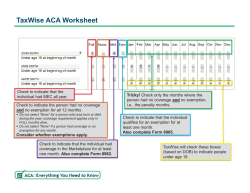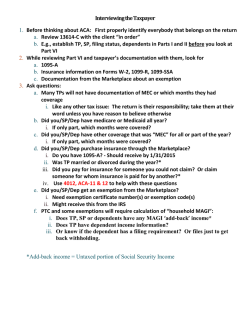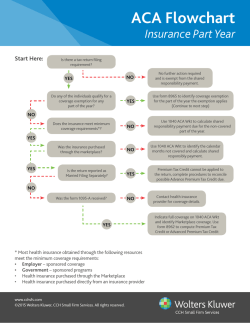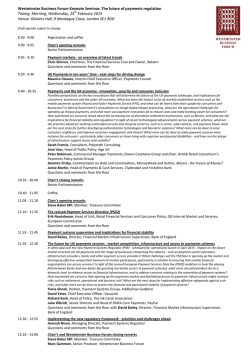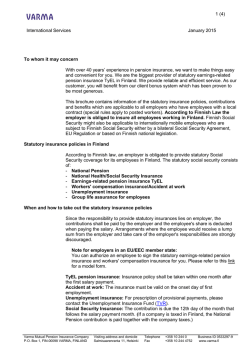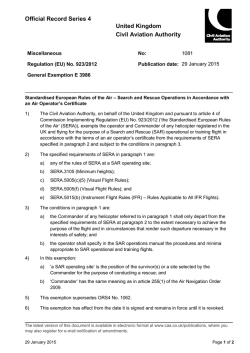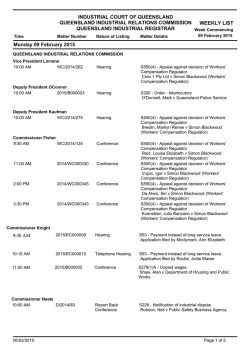
[7.1.2] Compensation Payments in respect of Personal Injuries
7.1.2 [7.1.2] Compensation Payments in respect of Personal Injuries (Exemption of Investment Income) Section 189 TCA 1997 Updated January 2015 Other Reference Material: Leaflet IT13 This instruction also includes material from Tax briefing 44 1. Introduction Section 189 TCA 1997 exempts permanently incapacitated individuals from income tax and capital gains tax on the income arising and the gains accruing from the investment, in whole or in part, of compensation payments which arise from an order under section 38 of the Personal Injuries Assessment Board Act 2003 or the institution by the individual of court proceedings in respect of personal injury claims. The injury must be such that the individual is permanently and totally incapacitated from maintaining himself or herself. The purpose of this instruction is to: (a) provide guidance on how section 189 should be interpreted in practice; (b) set out the main features of the exemption; and (c) advise how disability benefit, invalidity pension, and certain other social welfare payments are to be treated when calculating a person’s income for the purposes of deciding if exemption under section 189 is due. [Section 613(1)(c) TCA 1997 provides for an exemption from Capital Gains Tax for the actual compensation or damages received for any wrong or injuries suffered by a person. Please refer to Manual 19.7.10 for more detail on this.] 2. Meaning of permanently and totally incapacitated Section 189 applies to an individual who is permanently and totally incapacitated from maintaining himself or herself, by reason of a mental or physical infirmity which arose from an injury. “Maintain” means to support oneself by earning an income from working. Total incapacity, therefore, means that an individual is not capable of earning a living from any kind of work. The incapacity must also be permanent; i.e. there must be no prospect of the individual recovering or of the condition improving to the extent that the individual would be able to maintain him or herself. 1 7.1.2 This is quite a high threshold of incapacity. For example, a visually impaired individual or an individual who has lost the use of his or her legs could be described as permanently incapacitated but not necessarily totally incapacitated or incapable of maintaining himself or herself by working. To assist in assessing the circumstances of an individual, a certificate from a medical practitioner: (i) stating the cause, nature and extent of the infirmity, and the nature and extent of the incapacity arising therefrom, and (ii) confirming that the individual is permanently incapacitated by reason of physical or mental infirmity from maintaining himself or herself should accompany any claim for the exemption. Notwithstanding the explanation of ‘permanent and total incapacity’ above, by long-standing practice engagement in rehabilitative work in sheltered workshops has not been considered as indicating that an individual may not be permanently and totally incapacitated. See paragraph 3.3 below. 3. Conditions of exemption 3.1 Section 189 requires that: (a) the compensation payment must arise (i) pursuant to the issue of an order to pay under section 38 of the Personal Injuries Assessment Board Act 2003, or (ii) following the institution of a civil action by or on behalf of an individual, for damages in respect of personal injury; (b) the injury must have resulted in the individual being permanently and totally incapacitated, either physically or mentally, from maintaining him or herself, and (c) the income or gains must arise from the investment in whole or in part of payments made on foot of the personal injury which resulted in the permanent and total incapacity. Where there is a pre-existing incapacity, it will be necessary to establish that the injuries giving rise to the compensation resulted in the individual becoming permanently and totally incapacitated from maintaining him or herself. In this connection, the extent of the injuries, the medical evidence, the individual’s previous ability to maintain him or herself through a profession, business or occupation, and the details of the award made in the case will be elements in determining the eligibility for the relief. 3.2 The following payments would not qualify for exemption: (a) Compensation payments received as a result of minor injuries, and 2 7.1.2 (b) A compensation payment to an individual whose injury causes a permanent incapacity, but the incapacity is not total or does not prevent the individual from carrying on a profession, business or occupation. The amount of the compensation payment may be an indicator of the extent to which the person is incapacitated. In general, the payments will be large. However, this may not always be the case as an award may be substantially reduced because the person's own negligence was a factor, which contributed to the injury. 3.3 Note that in some instances individuals may be engaged in rehabilitative work in sheltered workshops. This should not be regarded as debarring them from claiming the exemption. 3.4 Out of court settlements While the compensation must arise from an order to pay under section 38 of the Personal Injuries Assessment Board Act 2003 or the institution of legal action, a payment made by way of out-of-court settlement also qualifies for exemption. 3.5 Payments from the Criminal Injuries Compensation Tribunal Payments from the Criminal Injuries Compensation Tribunal should be regarded as arising from the institution of legal action. (This tribunal compensates, on an ex gratia basis, victims of crimes of violence where recourse to the courts is not available because, for example, the aggressor is not known.) 3.6 Hepatitis C compensation payments Where it is medically certified that an individual is suffering from a degenerative condition which will ultimately cause a permanent and total incapacity by reason of mental or physical infirmity and the condition gave rise to the compensation payment, Revenue accepts that the requirements of section 189 are met. This applies to individuals who have been diagnosed positive for Hepatitis C antibodies or Hepatitis C. 4. The exemption 4.1 The exemption covers dividends or other income chargeable to tax under Schedule C, or Cases III, IV or V of Schedule D, or Schedule F, and arising from the investment, in whole or in part, of the compensation payment (or arising from the investment of such income). 4.2 The exemption only applies where the aggregate of the income and gains derived from such compensation payments exceed 50% of the aggregate total income and total chargeable gains (including allowable losses) of the individual for the year of assessment. If two individuals who are married to 3 7.1.2 each other or who are civil partners of each other are assessed under the provisions of section 1017 or 1031C TCA 1997 - (aggregation basis), the 50% test should be applied only to the income of the incapacitated spouse or civil partner, and not to the aggregated income of the two individuals who are married to each other or who are civil partners of each other, in determining if exemption is due 5. Treatment of payments by the Department of Social Protection 5.1 Where a person claims exemption under section 189 and that person is in receipt of either, (a) Illness Benefit, (b) Invalidity pension, or (c) Injury or disablement benefit, and/or (d) Incapacity supplement paid to a person getting disablement benefit, which is paid by the Department of Social Protection, and the injury or disability which gave rise to the payment of the benefit/pension, by that Department, is the same injury or disability which gave rise to the payment of the compensation, that benefit/pension (i.e., from the Department of Social Protection) should not be taken into account when calculating whether the investment income is the sole or main income of the individual. 5.2 Where any of the benefits listed at 5.1 above are increased because of a dependant spouse / civil partner or child, the full amount of the benefit/pension (as increased) should be excluded. 5.3 An invalidity pension and certain other benefits paid by the Department of Social Protection are liable to tax under Schedule E. Therefore, notwithstanding the fact that an invalidity pension or benefit payable by the Department of Social Protection is not taken into account for the purposes of calculating whether a person's sole or main income is derived from the investment of the compensation, the amount of such pension or benefit is still taxable in the hands of the recipient. 5.4 Example: The following illustrates how this instruction is to operate in practice: Joe is employed as a plumber. He has 2 houses let for a number of years, yielding a net total of €28,800 per annum. He was involved in an accident on a building site, as a result of which he suffered severe injuries such that he is permanently and totally incapacitated from maintaining himself. He instituted proceedings against his employer, and accepted an amount of €400,000 in an out-of-court settlement. This is invested, and currently yields €36,000 per annum. He is also entitled to an invalidity pension of €10,347 per annum. 4 7.1.2 In 2013, Joe claims exemption under section 189 TCA 1997. income for 2013 is Investment Income €36,000 Rental Income €28,800 Invalidity Pension €10,347 Total €75,147 His total For the purposes of deciding whether he is entitled to the exemption claimed, the invalidity pension is ignored. Therefore, because the money from the investment of the compensation, comes to €36,000, i.e. more than 50% of his total income, excluding the invalidity pension, (€75,147 less €10,347), he is entitled to the exemption as claimed. His income for income tax purposes is calculated as follows: Case V €28,800 Schedule E €10,347 Total Income for tax purposes €39,147 The investment income of €36,000 is exempt by virtue of section 189. 5.5 The exempt income is not to be taken into account in computing total income for tax purposes. This does not relieve the individual of the obligation to return the exempt income if making a return of income. 6. Special features 6.1 Wards of Court Wards of Court are individuals who, by reason of age, intellectual disability or other reasons, are unable to manage their affairs and who have been placed by the President of the High Court under the care of a Committee. The Committee can consist of one or more persons. While the Committee has responsibility for the care of the Ward of Court, it cannot spend, invest or disburse any of the Ward's assets without the express consent of the Office of the Wards of Court. Persons who are Wards of Court can have varying degrees of incapacity. It should not be assumed that all such persons are permanently and totally incapacitated, and therefore entitled to the exemption. The Committee for a Ward of Court must show that the Ward meets all the requirements of section 189 before exemption is granted. 6.2 Deposit Interest Retention Tax, Schedule F, etc. 5 7.1.2 Notwithstanding the fact that deposit interest, Schedule F dividends, taxed income, etc. arising from the investment of a compensation payment are, under the provisions of section 189, excluded from total income, a refund of the retention tax or tax credits (as appropriate) attaching to such income may be made, if otherwise due. 7. Reinvestment in other assets Section 189 specifies that the exemption from income tax applies to income arising from the investment in whole or in part of such payments or of income from such payments. It is recognised that an asset may, over the period of an investment, appreciate in value and any re-investment of such funds may also qualify for exemption. For example, in 2000 an individual used €200,000 from a qualifying compensation payment to acquire a property the full cost of which came from the compensation payment. The property was let and the rental income generated was covered by the exemption under section 189 TCA 1997. If the property was sold in the year 2014 for €600,000 and all the proceeds (after costs) were re-invested in another investment property, the exemption would also apply to all the rental income from the new property. In these circumstances the source of income clearly arises from the investment of the compensation funds alone and not from any other source. 8. Assets financed partly by borrowings Where a relevant individual finances the purchase of an asset partly with a qualifying compensation payment and partly with a loan, then only a portion of the income will qualify for exemption. The income that qualifies is the proportion to which the compensation payment (together with any capital appreciation thereof) used to finance the asset bears to the total funds expended to finance the asset. The exemption can only be given, as the legislation requires, in respect of income arising from the investment of the compensation payments. 9. Special trusts for permanently incapacitated individuals Revenue policy as set out in this instruction, also applies to the exemption from income tax and capital gains tax under section 189A TCA 1997 of the income earned by, and the gains accruing to, special qualifying trusts, established for the benefit of specified permanently incapacitated individuals, and arising from the investment of the trust funds. The following material is either exempt from or not required to be published under the Freedom of Information Act 2014. […] 6
© Copyright 2026
